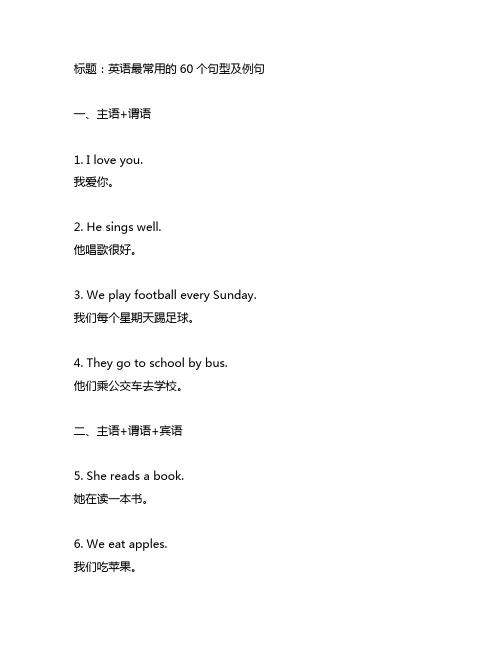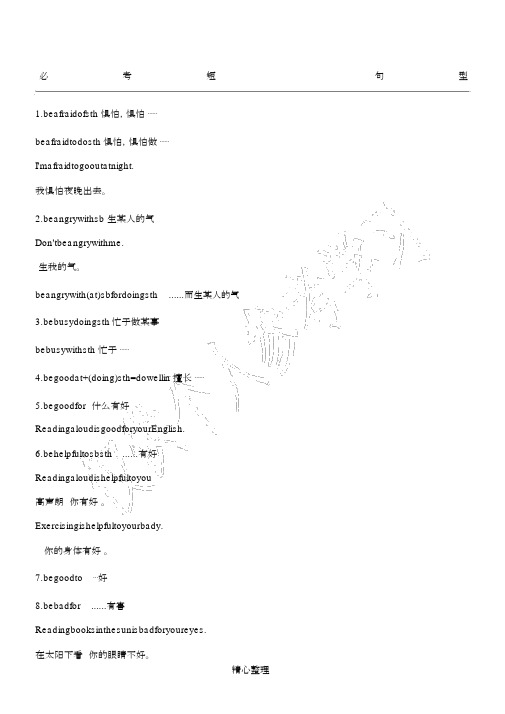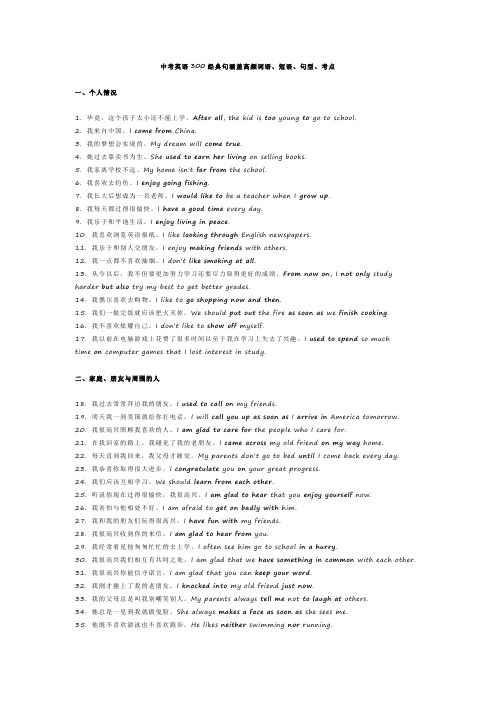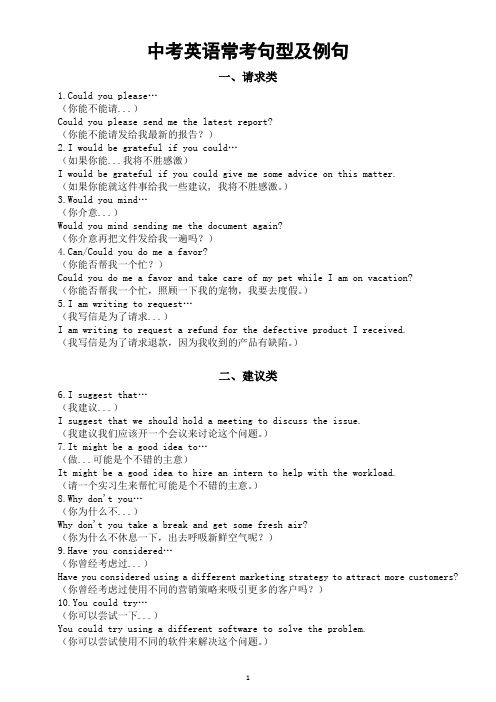初中英语必会60个经典句型
英语最常用的60个句型及例句

标题:英语最常用的60个句型及例句一、主语+谓语1. I love you.我爱你。
2. He sings well.他唱歌很好。
3. We play football every Sunday. 我们每个星期天踢足球。
4. They go to school by bus.他们乘公交车去学校。
二、主语+谓语+宾语5. She reads a book.她在读一本书。
6. We eat apples.我们吃苹果。
7. He speaks English.他讲英语。
8. They watch TV.他们看电视。
三、主语+谓语+宾语+宾语补足语9. She paints the wall red.她把墙刷成了红色。
10. We call him a hero.我们称他为英雄。
11. He considers the plan unfeasible. 他认为这个计划不可行。
12. They make their father proud.他们让父亲感到自豪。
四、主语+系动词+表语13. I am a teacher.我是一名老师。
14. She was happy.她很快乐。
15. He is my friend.他是我的朋友。
16. They are students.他们是学生。
五、主语+谓语+间宾+直宾17. She teaches us English. 她教我们英语。
18. He bought her a gift. 他给她买了一份礼物。
19. We tell him a story.我们给他讲故事。
20. They show us the way.他们给我们指路。
六、主语+谓语+宾补+宾语21. She made her sister cry.她让她妹妹哭了。
22. They found the problem solved. 他们发现问题已经解决了。
23. He heard the news spread.他听说了消息已经传开了。
初中英语学习的60个必备句型!

初中英语学习的60个必备句型!句型1:There+be +主语+地点状语/时间状语There's a book on the desk.桌上有本书。
句型2:What’s wrong with+sb. / sth. ?What's wrong with you?你怎么了?句型3:How do you like...?How do you like Nanjing?你觉得南京怎么样?句型4:What do you like about...?What do you like about Nanjing?你喜欢南京什么?句型5:had better(not)+动词原形You'd better have a rest.你最好休息一下。
句型6:How+adj. / adv. +主语+谓语! ;What a/an+adj. +n. +主语+谓语!How beautiful the girl is !这个姑娘真漂亮!What an interesting book it is!多有趣的一本书呀!句型7:Thank+sb. +for (doing) sth.Thank you for helping me.感谢你帮我。
句型8:So+be/ 情态动词/ 助动词+主语He is a doctor. So am I.他是一个医生,我也是。
句型9:... not ... until ...He didn't do his homework until his mother came back.直到他的父母回来他才写作业。
句型10:比较级+and+比较级It rained harder and harder.雨越下越大。
句型11:the +比较级,the +比较级The more careful you are ,the fewer mistake you will make.越仔细,越少犯错。
初中英语必考短语句型

必考短句型1.beafraidofsth 惧怕,惧怕⋯⋯beafraidtodosth 惧怕,惧怕做⋯⋯I'mafraidtogooutatnight.我惧怕夜晚出去。
2.beangrywithsb 生某人的气Don'tbeangrywithme.生我的气。
beangrywith(at)sbfordoingsth......而生某人的气3.bebusydoingsth忙于做某事bebusywithsth 忙于⋯⋯4.begoodat+(doing)sth=dowellin 擅长⋯⋯5.begoodfor 什么有好ReadingaloudisgoodforyourEnglish.6.behelpfultosbsth ......有好Readingaloudishelpfultoyou高声朗你有好。
Exercisingishelpfultoyourbady.你的身体有好。
7.begoodto⋯好8.bebadfor......有害Readingbooksinthesunisbadforyoureyes.9.beglad+todosth/从句很高 ......10.behappytodo很高做某事11.besorrytodosth于做 ......而对不起 /憾12.besorrytohearthat...憾听 ......13.besureofdoingsth做某事有信心Heissureofwinning.他有信心 .besureofsth某事有信心I'msureofmyhead.我相信我的大。
besuretodosth必定会做某事Wearesuretopassthetest.我必定会通次考。
14.bemadefrom由⋯⋯制成 (制成此后看不原资料 )bemadeof由⋯⋯制成 (制成此后看得原资料)15.begintodo=starttodo开始做某事start⋯with⋯ =begin⋯ with以⋯......开始......Let'sbeginthegamewiththesong.16.getreadyforsth./todosth.getreadyforsth.意“ 某事做准”;getreadytodosth意.“准做某事”Wearegettingreadyforthemeeting.我正在会做准。
中考英语300经典句涵盖高频词语、短语、句型、考点

中考英语300经典句涵盖高频词语、短语、句型、考点一、个人情况1. 毕竟,这个孩子太小还不能上学。
After all, the kid is too young to go to school.2. 我来自中国。
I come from China.3. 我的梦想会实现的。
My dream will come true.4. 她过去靠卖书为生。
She used to earn her living on selling books.5. 我家离学校不远。
My home isn't far from the school.6. 我喜欢去钓鱼。
I enjoy going fishing.7. 我长大后想成为一名老师。
I would like to be a teacher when I grow up.8. 我每天都过得很愉快。
I have a good time every day.9. 我乐于和平地生活。
I enjoy living in peace.10. 我喜欢浏览英语报纸。
I like looking through English newspapers.11. 我乐于和别人交朋友。
I enjoy making friends with others.12. 我一点都不喜欢抽烟。
I don't like smoking at all.13. 从今以后,我不但要更加努力学习还要尽力取得更好的成绩。
From now on, I not only study harder but also try my best to get better grades.14. 我偶尔喜欢去购物。
I like to go shopping now and then.15. 我们一做完饭就应该把火灭掉。
We should put out the fire as soon as we finish cooking.16. 我不喜欢炫耀自己。
初中英语八大时态+60句必考句型

初中英语八大时态+60句必考句型一般现在时一、概念:经常、反复发生的动作或行为及现在的某种状况。
二、常搭配的时间状语:always, usually, often, sometimes, every week (day, year, month…), once a week, etc.三、基本结构①be动词(is,am,are);②行为动词(主语是第三人称单数时谓语动词要加s或es外)否定形式:①am/is/are+not;②此时态的谓语动词若为行为动词,则在其前加don't,如主语为第三人称单数,则用doesn't,同时还原行为动词。
一般疑问句:①把be动词放于句首;②用助动词do提问,如主语为第三人称单数,则用does,同时,还原行为动词。
例句:I go to school at 6 every morning. 每天早上我七点去上学。
Summer follows spring. 春天之后是夏天。
四、基本用法:1) 描述当前时间内经常出现、反复发生的动作或存在的状态。
在这种情景中,句子常带有表示频率的时间状语:always , everyday , often , once a week (month , year , etc.) , sometimes , seldom , usually等等,以表示句中的动作或状态是习惯性的、经常性的。
例如:They raise ducks as a sideline .他们以养鸭为副业。
2)仅为了描述状态、性质、特征、能力等等。
这里的目的是为了"描述现阶段的动作或状态",其重点"不是强调动作发生的时间、或进行的状态"。
例如:He can speak five foreign languages .他能说五种外语。
That is a beautiful city .那是座美丽的城市。
3) 陈述客观事实、客观真理。
初中英语学习必背的62个句型,句句经典!

句型1:There+be +主语+地点状语/时间状语 There’s a boat in the river. 河里有条船。
句型2:What’s wrong with+sb./sth.? What’s wrong with your watch? 你的手表有什么毛病? 句型3:How do you like...? How do you like China? 你觉得中国怎么样? 句型4:What do you like about...? What do you like about China?你喜欢中国的什么? 句型5:had better(not)+动词原形 You’d better ask that policeman over there. 你最好去问问那边的那个警察。
句型6:How+adj. / adv. +主语+谓语! What a/an+adj. +n. +主语+谓语! How cold it is today ! 今天多冷啊! What a fine picture it is! 多美的一幅图画呀! 句型7:Thank+sb. +for (doing) sth.Thank you for coming to see me. 感谢你来看我。
句型8:So+be/ 情态动词/ 助动词+主语 He is a student. So am I. 他是一个学生,我也是。
句型9:... not ... until ... He didn’t have supper until his parents came back. 直到他的父母回来他才吃饭。
句型10:比较级+and+比较级 The baby cried harder and harder. 那孩子哭得越来越厉害。
句型11:the +比较级,the +比较级 The more one has,the more one wants. 越有越贪。
初中英语完成句子60个典型句型

第一组1. Come on, children. It's time to have lunch.2.They were late for the meeting because of the heavy traffic yesterday.3.She is now in great trouble. Let's / Let us help her.4.Will you please call me as soon as you get to / arrive in / reach Shanghai?5.The seven –year –old girl likes playing the piano so much that she has kept practicing for two years.6. Y ou’d better go home7. What/How about tomorrow8. too old to use9. is as famous/popular as10. it’s not possible to make her rest in bed11. It’s time for/ to have12. Why not go (there)13. There is something wrong with14. to keep you waiting15. He spent so much time(in)playing computer games that第二组1. he enjoys / likes doing2. Why not / Why don’t you eat more3. be late for school4. is too young to /so young that she can’t go to school5. is important for us to learn English, one of the most popular languages6. Let’s go to school7. didn’t go home until8. sending me the CD / sending the CD to me9. China is famous for the Great Wall.10. not only studies well, but (also) likes helping others / is not only good at lessons / studies / study, but also readyto help others11、What’s wrong with you/ What’s the matter with you12、is only/just four years old13、getting hotter and hotter14、makes us read aloud/ keeps us reading aloud15、so much that he spends hundreds of dollars on/buying books / so much that he pays hundreds of dollars forbooks/ so he spends hundreds of dollars on/buying books第三组1.How/ What about going for a picnic2.we’d better ask the teacher for help/ ask the teacher to help us3.either surf the Internet or watch TV4.hasn’t stopped/ doesn’t stop many young people from buying their own cars5.are afraid that they can’t finish reading this book until next weekend.6.Would you like/Do you want to go to a movie/ a cinema theater7.there is something wrong/ something is wrong8.is very glad that I’m already as tall as her/she9.Both my son and I/ My son and I both, are busy getting ready for/preparing for10.tell me how long it will take the workers to build this new schooled to be afraid of12.doesn’t want to give up our hope at all./wouldn’t like to give up our hope in the slightest13.has stopped raining14.he called me up as soon as he came back/returned to Beijing15.not only help us with study, but also often tell us how to get along/on well with others16.It’s time for homework/ It’s time to do homework17.neither too early nor too late18.take an umbrella with you19.very important/crucial for every student to keep their own classrooms clean and tidy20.it’s good for health to eat too much sugar21.Why not tell us your story/ Why don’t you tell us your story22.going on helping me23.never too young to start our business24.the friendlier/more friendly they will be to us25.are busy cleaning up the rooms, (and )others are getting ready to act for them.。
初中英语中考常考句型及例句(共九大类60个)

中考英语常考句型及例句一、请求类1.Could you please…(你能不能请...)Could you please send me the latest report?(你能不能请发给我最新的报告?)2.I would be grateful if you could…(如果你能...我将不胜感激)I would be grateful if you could give me some advice on this matter.(如果你能就这件事给我一些建议, 我将不胜感激。
)3.Would you mind…(你介意...)Would you mind sending me the document again?(你介意再把文件发给我一遍吗?)4.Can/Could you do me a favor?(你能否帮我一个忙?)Could you do me a favor and take care of my pet while I am on vacation?(你能否帮我一个忙,照顾一下我的宠物,我要去度假。
)5.I am writing to reque st…(我写信是为了请求...)I am writing to request a refund for the defective product I received.(我写信是为了请求退款,因为我收到的产品有缺陷。
)二、建议类6.I suggest that…(我建议...)I suggest that we should hold a meeting to discuss the issue.(我建议我们应该开一个会议来讨论这个问题。
)7.It might be a good i dea to…(做...可能是个不错的主意)It might be a good idea to hire an intern to help with the workload.(请一个实习生来帮忙可能是个不错的主意。
- 1、下载文档前请自行甄别文档内容的完整性,平台不提供额外的编辑、内容补充、找答案等附加服务。
- 2、"仅部分预览"的文档,不可在线预览部分如存在完整性等问题,可反馈申请退款(可完整预览的文档不适用该条件!)。
- 3、如文档侵犯您的权益,请联系客服反馈,我们会尽快为您处理(人工客服工作时间:9:00-18:30)。
初中英语经典句型这60个句型中包含词汇、短语、固定搭配和语法等全方位的知识点,因此,它们的重要性是不言而喻的!1. as…as和……一样中间必须用形容词或副词原级。
例如:This classroom is as big as that one.这间教室和那间一样大。
He runs as fast as Tom.他和汤姆跑的一样快。
否定结构:not as/so…as,“不如……”。
上面的两个句子可分别改为:This classroom is not as/so large as that one.这间教室不如那间大。
He doesn’t run as/so fast as Tom.他跑得不如汤姆快。
2. as soon as一……就……用来引导时间状语从句。
若主句是一般将来时,从句要用一般现在时。
例如:I’ll tell him the plan as soon as I see him.我一看到他就告诉他这个计划。
He’ll go home as soon as he finishes his work.他一完成工作就回家。
3. be busy/enjoy/hate/go on/finish doing sth.忙于/喜欢/讨厌/继续/完成做某事在enjoy, finish, hate, go on, be busy等词语后,一般用动词-ing形式作宾语。
例如:Lin Tao is busy making a model plane.林涛正忙着做飞机模型。
My mother enjoys taking a walk after supper.我妈妈喜欢晚饭后散步。
I hate watching Channel Five.我讨厌看五频道。
When someone asked him to have a rest, he just went on working.当有人让他休息一会儿时,他仍继续工作。
I have finished writing the story.我已经写完了故事。
4. fill…with用……装满......;be filled with充满了……;be full of 充满了......①be filled with说明由外界事物造成的此种状态,表示被动。
例如:The box is filled with food.盒子里装满了食物。
②be full of说明主语处于的状态。
此外,还可表示程度,意为“非常”。
例如:The patient’s room is full of flowers.那个病人的房间摆满了花。
The young man is full of pride.那个年轻人非常骄傲。
③这两种结构还可以相互改写。
例如:I fill the box with food. The box is full of food.5. be good/bad for有利于/有害于……此句型是:be+adj.+for+n.结构。
例如:Doing morning exercises is good for your health.做早操对你的健康有益。
Always playing computer games is bad for your study.总玩电脑游戏对你的学习不利。
6. be used to(doing) sth.习惯于……后必须接名词或动名词,可用于现在、过去、将来的多种时态。
be 可用get,become来代替。
例如:He is used to life in the country.(He is used to living in the country.)他习惯于乡村生活。
He will get used to getting up early.他将会习惯于早起。
注意:be used to do的意思是“被用来做……”。
例如:Wood is used to make paper.木材被用来造纸。
7. both…and…两者都……用来连接两个并列成分;当连接两个并列主语时,其后谓语动词用复数。
例如:Both the students and the teachers will go to the History Museum tomorrow.不论老师还是学生明天都会去历史博物馆。
8. can’t help doing sth.禁不住做某事help在此的意思是“抑制,忍住”,其后接动词-ing形式。
例如:His joke is too funny. We can’t help laughing.他的笑话太有趣了,我们禁不止笑了起来。
9. sth. costs sb. some money某物花费某人多少钱此句型的主语是物。
cost一词带的是双宾语,它的过去式、过去分词和原型一样。
This book cost me five yuan.这本书花了我五元钱。
10. either…or…不是……就是……,或者……或者……用来连接两个并列成分,当连接并列主语时,谓语动词与邻近的主语保持一致。
You may either stay here or go home.你可以呆在这儿,也可以回家。
Either she or I am right. = Either I or she is right.不是她对就是我对。
11. enough (for sb.) to do sth.足够……做……在此结构中,for用来引出不定式的逻辑主语。
例如:The ice isn’t thick enough for you to walk on.这冰还没有厚到你可以在上面走的程度。
12. feel like doing sth.想要做某事此处like为介词,后面跟动词-ing形式。
此句型与would like to do sth.同义。
例如:I feel like drinking a cup of milk.我想喝一杯牛奶。
13. feel/find/think it adj./n. to do sth.认为某事……在此结构中it为形式宾语,不定式短语作真正的宾语。
例如:I find it very interesting to play football.我发现踢足球很有趣。
She thinks it her duty to help us.她认为帮助我们是她的职责。
14. get ready for sth./to do sth.get ready for sth.意为“为某事做准备”;get ready to do sth.意为“准备做某事”例如:We are getting ready for the meeting.我们正在为会议做准备。
They were getting ready to have a sports meet at that moment.他们那时正准备开运动会。
15. get/receive/ a letter from收到……的来信相当于hear from例如:Did you receive a letter from John?你收到约翰的来信了吗?I got a letter from my brother yesterday.我昨天收到了我弟弟的一封来信。
16. had better (not) do sth.最好(别)做某事had better为情态动词,其后需用动词原形。
had better常用缩写,变成’d better,其否定形式是在其后直接加not。
例如:We had better go now. = We’d better go now.我们最好现在走吧。
You’d better not go out because it is wind y.今天刮风,你最好别出去了。
17. have sth. done使(某事)完成(动作由别人完成)sth.为宾语,done为过去分词作补语。
例如:We had the machine repaired.我们请人把机器修好了。
注意区分:We have repaired the machine.我们(自己)已经修好了机器。
18. help sb. (to) do sth./with sth.帮助某人(做)某事其中的to可以省略。
例如:I often help my mother with housework.我常常帮助妈妈做家务。
Would you please help me (to) look up these words?请你帮助我查查这些词好吗?19. How do you like…?你认为……怎么样?与what do you think of …?同义。
例如:How do you like the weather in Beijing?你认为北京的天气怎么样?你觉得这部新电影如何?20. I don’t think/believe that…我认我/相信……不……其中的not是对宾语从句进行否定而不是对主句否定(否定前移)。
that可省略。
例如:I don’t think it will rain.我认为天不会下雨。
I don’t believe the girl will come.我相信那女孩不会来了。
21. It happens that…碰巧……相当于happen to do。
例如:It happened that I heard their secret.可改写为:I happened to hear their secret.我碰巧听到了他们的秘密。
22. It’s/has been +一段时间+since从句自从某时起做某件事情已经一段时间了该句型中since引导的时间状语从句常用一般过去时。
例如:It’s twenty years since he came here.他来这里已经20年了。
It has been six years since he married Mary.他和玛丽结婚已经六年了。
23. It is +adj./n. + for sb. to do sth.做某事对某人来说……It是形式主语,真正的主语是不定式to do sth。
例如:It’s not easy for us to study English well.对我们来说学好英语并不容易。
It’s a good idea for us to travel to the south.去南方旅行对我们来说是个好主意。
24. It’s + adj. + of sb. to do sth.It是形式主语,to do sth.是真正的主语,当表语(即形容词)能对逻辑主语描述时,常用介词of,而不用for。
